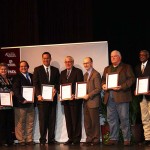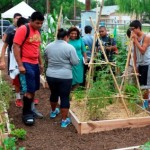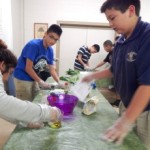School IPM, Staff Member Receive Excellence Awards for 2015 By Rob Williams
The Texas School Integrated Pest Management Program received the AgriLife Extension Service’s Superior Service Award in the Team category during the Texas A&M AgriLife Conference on January 6.
The team consists of Dr. Blake Bennett, AgriLife Extension economist-management, Dallas; Wizzie Brown, AgriLife Extension program specialist, Travis County; Janet Hurley, AgriLife Extension program specialist, entomology, Dallas; Molly Keck, AgriLife Extension program specialist, entomology, San Antonio; Dr. Mike Merchant, AgriLife Extension urban entomologist, Dallas; Dr. Paul Nester, AgriLife Extension program specialist, entomology, Houston; and Dr. Don Renchie, AgriLife Extension program leader, agricultural and environmental safety, College Station.
Other members joining the main team are Alva “AJ” Clinton, Springtown Independent School District maintenance director and school IPM coordinator; Paul Duerre, Killeen ISD environmental specialist and school IPM coordinator; and Tom Ohm, Frisco ISD IPM coordinator.
The AgriLife team members are responsible for conducting training for all IPM coordinators for each school district, which is required by the State of Texas. Whereas the school members recognized have been instrumental in establishing the professional association TIPMAPS for school IPM coordinators.

Members of the School IPM Team receiving their plaques during the 2015 Texas A&M AgriLife Conference on January 6. From left to right are: Wizzie Brown, Molly Keck, Janet Hurley, Paul Duerre, IPM Coordinator, Killeen ISD; Dr. Blake Bennett, Associate Professor & Extension Economist/Management; AJ Clinton, IPM Coordinator, Springtown ISD, Dr. Mike Merchant, Paul Nester, Dr. Don Renchie, and Dr. Douglas Steele – Director, Texas A&M AgriLife Extension Service. Photo by Rob Williams
Since 2001, according to the nomination, the team has provided training or direct assistance to more than 600 school districts and nearly 1,000 school employees. The team also hosts a website, publishes a monthly newsletter and creates other materials to educate schools about pest management.
“The IPM training’s are very informative. I attend almost every year because every time I come I learn something new,” said Harry Magness, a retired IPM Coordinator from Tyler ISD. “The school IPM team has always been there to help me with pest ID, control solutions and as a sounding board on how to maintain my IPM program. Without them we [the school districts] would be lost.”
According to the nomination, the team also created a database of more than 1,500 school IPM coordinators, pest management professionals, and key stakeholders to facilitate communications and created the IPM Calculator tool for pest management in school facilities.
“She has gone over and above the call of duty to help us in every way. She has come down to Houston on many occasions to meet with our leadership team to discuss the best plans moving forward, to show our team what IPM truly is, and has helped us implement our program in every way,” one nominator said in the nomination “Janet is the true picture of ‘Customer First Service’.”
According to the nomination packet, the website (schoolipm.tamu.edu) receives more than 13,000 unique visitors annually and the newsletter has more than 1,560 email subscribers monthly. The team also has received more than $1.3 million in competitive grants to fund its programs.
“The award signifies the commitment our group has to school IPM,” Hurley said. “Just like IPM is about teamwork, the school IPM team works together to assist schools with their IPM programs.”
Garden of Greatness 4-H club plants seeds for teens’ future By: Paul Schattenberg
Jeremy Mann, 16, said teamwork and coordinating with other teenagers in the Garden of Greatness 4-H special interest, or SPIN, club in San Antonio were among the things he enjoyed most about participating in the youth development program that uses gardening to teach practical skills and life lessons.
Mann, who attends Kipp University Prep charter high school, said he also enjoyed learning how to use the vegetables he and other participants grew to make healthful, nutritious dishes.
“It was nice to do something for the community too,” he said. “This was my first time to do any gardening, and it was fun to plant and grow these vegetables.”
Mann was one of about 30 youth who recently “graduated” from the four-month, Texas A&M AgriLife Extension Service-led program at the San Antonio Boys and Girls Club Teen Center on the city’s west side.
Club members, along with AgriLife Extension personnel, Bexar County Master Gardeners and others, planted 15 raised beds built by program partners and youth participants. In early September, they planted tomatoes, broccoli, red lettuce, cabbage, onions, carrots, peppers and other vegetables, as well as various herbs.

Teen participants and adult volunteers built the Garden of Greatness in back of the San Antonio Boys and Girls Club Teen Center. The raised garden beds were used to grow cold-weather vegetables during the recently completed fall program. (Texas A&M AgriLife Extension Service photo)
Teen program participants weeded, fertilized, watered and otherwise took care of the garden in accordance with the curricula from the Texas Go! Eat! Grow! Program of AgriLife Extension.
“The kids harvested the garden, then at graduation received their certificate for completing the program and competed as teams in preparing healthful dishes made from the vegetables and herbs they grew and harvested,” said Rosemary Fuentes, AgriLife Extension health and wellness program specialist for Bexar County, who coordinates the program.
Fuentes said club efforts are part of a five-year U.S. Department of Agriculture-funded community-based project to address the issue of urban food deserts, while providing youth with new experiences and opportunities.
“An urban food desert is an area where affordable and nutritious food is difficult to obtain,” she said. “These are typically in low-income areas where there are few or no supermarkets and limited access to transportation.”
Fuentes said youth gain practical service-learning experiences and engage in developing useful life skills while learning about professional career opportunities in health, nutrition, horticulture, agriculture, science and more. They also learn about proper nutrition and food preparation by making healthy snacks in the club kitchen, using recipes provided by nutrition experts who help them prepare the snacks.
“The experience helped these young people become a little more college-ready and gave them some good insights into career opportunities in nutrition, horticulture, agriculture and associated fields,” she said.
The last program was a 16-week program, but starting in February we are going to make it a 10-week program,” she said. “This way, we hope we will be able to get even more youth to participate.”
Fuentes said one of the project’s main goals is to address the lack of experience which, along with a lack of education, exacerbates poverty among at-risk youth.
“We want to help encourage these teens to grow and to give back to their community,” she said. “We show them the value of gardening and horticulture and of eating nutritious, healthful food. They also learn important life skills like personal responsibility, teamwork and cooperation, which will serve them throughout their adult lives and in their careers.”
Dr. Manuel Piña Jr., an associate professor in the agricultural leadership, education and communication department of Texas A&M University’s College of Agriculture and Life Sciences in College Station, spoke to program participant at the graduation. Piña related the importance of education and of the need for persistence and teamwork in reaching personal goals.
“We hope youth participation in this program will lead to the more long-term goal of inspiring them to go to college and become professionals in one of these agriculture-related career fields,” he said.
Dr. Melinda Garcia, an Our Lady of the Lake University graduate who has participated in the program

Recent Garden of Greatness 4-H SPIN club program participants prepare recipes made with vegetables and herbs they grew and harvested. (Courtesy photo)
since its inception, also attended.
“It was great to see these young people participate in the program and devote their time and attention to it,” Garcia said. “I’m part of it because I want to serve the community and can help by serving as a role model. I grew up in a low-income area and had a lot of the same challenges these young people do, but was able to apply myself and get my PhD.”
Fuentes said she likes to think of the program not only as a way to help teenagers plant seeds in a garden, but also to help them plant seeds for their future.
“This project provides an innovative and engaging approach to not only help improve access to healthful, nutritious foods, but also to provide youth in those communities with the knowledge, hands-on experiential learning and life skills they need.”

 .
.